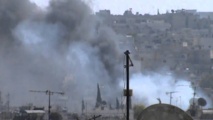
The so-called R2P doctrine was passed by the UN General Assembly in 2005 as the world sought a way to prevent a repeat of the horrors of the 1994 Rwanda genocide and the Srebrenica massacre in Bosnia.
UN leaders from Kofi Annan onwards and Western governments have hailed R2P as a humanitarian breakthrough, but its invocation, most recently in the 2011 intervention in Libya, has been controversial.
A 2005 UN summit laid down the responsibility for each state "to protect its populations from genocide, war crimes, ethnic cleansing and crimes against humanity."
If a state fails to do so, the 2005 declaration committed signatories "to take collective action, in a timely and decisive manner, through the Security Council, in accordance with the Charter, including Chapter VII, on a case-by-case basis and in cooperation with relevant regional organizations as appropriate, should peaceful means be inadequate and national authorities manifestly fail to protect their populations."
The Security Council used R2P in resolutions on Libya and Ivory Coast in 2011.
UN chief Ban Ki-moon said the use of the doctrine "came of age" when used in the resolutions that allowed military force against Libya's Moamer Kadhafi after his forces laid siege to the city of Benghazi and the dictator vowed to hunt down and kill rebels "house by house."
Russia and China, veto-wielding permanent members of the UN Security Council, abstained in the votes on the landmark resolutions 1970 and 1973, which allowed a no-fly zone and appropriate military strikes to protect Libyan civilians.
Russia later complained, however, that NATO went beyond the mandate and used the resolutions to bring down Kadhafi, who was eventually killed in October 2011.
Russia and China have since blocked any Security Council attempt to increase pressure on Syria's President Bashar al-Assad, whose forces are now accused by Western nations of launching a chemical weapons strike in the Damascus suburbs last week that left hundreds dead.
UN Secretary General Ban Ki-moon has said that any "outrageous" use of chemical weapons in Syria's 29-month old conflict would be a war crime.
The responsibility to protect can be carried out through the International Criminal Court investigations into war crimes, crimes against humanity and genocide.
But as Syria is not a member, only the Security Council could refer the case, and Russia is sure to block such a move.
Under a 1950 resolution, at the start of the Korean War, the UN General Assembly decided that if the Security Council was deadlocked, the 193-member assembly could step in to defend international peace and security.
The assembly could give its approval for a military operation now, but it would take time to build up a credible majority.
--------------------------------------------------------------------------------------------------------
UN leaders from Kofi Annan onwards and Western governments have hailed R2P as a humanitarian breakthrough, but its invocation, most recently in the 2011 intervention in Libya, has been controversial.
A 2005 UN summit laid down the responsibility for each state "to protect its populations from genocide, war crimes, ethnic cleansing and crimes against humanity."
If a state fails to do so, the 2005 declaration committed signatories "to take collective action, in a timely and decisive manner, through the Security Council, in accordance with the Charter, including Chapter VII, on a case-by-case basis and in cooperation with relevant regional organizations as appropriate, should peaceful means be inadequate and national authorities manifestly fail to protect their populations."
The Security Council used R2P in resolutions on Libya and Ivory Coast in 2011.
UN chief Ban Ki-moon said the use of the doctrine "came of age" when used in the resolutions that allowed military force against Libya's Moamer Kadhafi after his forces laid siege to the city of Benghazi and the dictator vowed to hunt down and kill rebels "house by house."
Russia and China, veto-wielding permanent members of the UN Security Council, abstained in the votes on the landmark resolutions 1970 and 1973, which allowed a no-fly zone and appropriate military strikes to protect Libyan civilians.
Russia later complained, however, that NATO went beyond the mandate and used the resolutions to bring down Kadhafi, who was eventually killed in October 2011.
Russia and China have since blocked any Security Council attempt to increase pressure on Syria's President Bashar al-Assad, whose forces are now accused by Western nations of launching a chemical weapons strike in the Damascus suburbs last week that left hundreds dead.
UN Secretary General Ban Ki-moon has said that any "outrageous" use of chemical weapons in Syria's 29-month old conflict would be a war crime.
The responsibility to protect can be carried out through the International Criminal Court investigations into war crimes, crimes against humanity and genocide.
But as Syria is not a member, only the Security Council could refer the case, and Russia is sure to block such a move.
Under a 1950 resolution, at the start of the Korean War, the UN General Assembly decided that if the Security Council was deadlocked, the 193-member assembly could step in to defend international peace and security.
The assembly could give its approval for a military operation now, but it would take time to build up a credible majority.
--------------------------------------------------------------------------------------------------------









 Home
Home Politics
Politics









